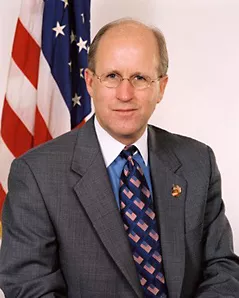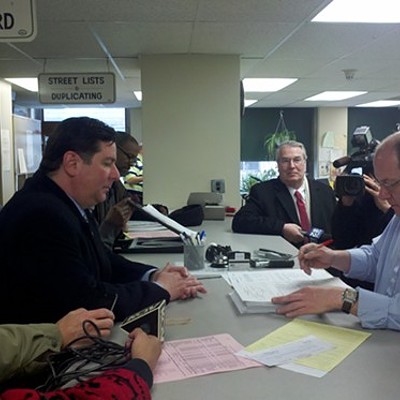Tuesday, March 12, 2013
Former U.S. Comptroller talks to students about federal deficit
David Walker is worried about the national debt.
"My family came to the United States in 1680," Walker, the former United States Comptroller General, told an audience of about 20 Pitt students on Feb. 27, "and each generation since then had a better life than the last.
"But I'm worried that our kids won’t."
Walker, appointed by President Bill Clinton in 1998, oversaw the use of public funds for nine years before becoming an activist in the anti-deficit movement. He met with Pennsylvania debt hawks and student activists on the University of Pittsburgh campus, and warned that if left unchecked, the $16 trillion national debt will cripple the economy.
Walker’s visit was the launch event for the newly-formed Pitt chapter of "The Can Kicks Back," a youth organization dedicated to pressuring lawmakers to make deficit reduction a priority. The national organization suggested holding the event when Pitt junior Carolanne Manteleone, a sociology major who also interns for the American Civil Liberties Union, reached out to them about starting a chapter.
"Every time Washington dodges a tough choice, it’s our generation, our jobs, our education, and our futures that's kicked down the road," Manteleone said, introducing Walker alongside two other speakers: David Patti, CEO of the Pennsylvania Business Council, and Thomas Rippon, CEO of Rippon Associates and co-chair of Fix the Debt Pennsylvania.

- U.S. Government Accountability Office
- David Walker
Fix The Debt is the brainchild of former senator Alan Simpson and former chief of staff Erskine Bowles, the Republican and Democrat appointed by President Obama to head the National Commission on Fiscal Responsibility and Reform. According to Rippon, when the President "walked away from" the Simpson-Bowles Commission, the two officials started a "grassroots organization" to pressure the government to adopt their recommendations.
"Government has grown too big, promised too much, and needs to restructure." Walker said. "We're spending more and more of the budget on seniors, more and more of the budget on consumption, less and less on investments, and less and less on young people. That is not a prescription for prosperity. And on our current path, it's going to get worse rather than better."
Walker, who said he's been a political independent since 1997, endorsed Republican Governor Mitt Romney for President in 2012 — not for his economic plan, but because he believes Obama is unable to lead on the deficit. Careful to avoid the appearance of partisanship, he adds that former President George W. Bush was "a disaster on this issue."
"This is about policy, not politics," Rippon said. "Fix the Debt is a nonpartisan organization. I tend to lean more Republican; my co-chair [former State Representative TJ Rooney] used to be head of the Democratic Party in Pennsylvania."
"Republicans want to reform social-insurance programs, but they don't want to raise taxes and close the loopholes to increase revenue," added Walker. "Democrats want tax reform, but they don't want to fix the entitlement programs. Neither party is going to bend unless the other does, and to fix the debt we're going to have to do both."
But not everyone is sold on Fix the Debt’s claim to bipartisan pragmatism. Fix the Debt has been called "pure Astroturf" — activist slang for a fake grassroots organization — and its leaders have been accused of conflicts of interest.
"Select bipartisan co-chairs, along with a passel of business leaders, write a press release, hold a teleconference et voilà!: a 'chapter' is born that looks like an organic, bipartisan effort," sneered The Nation's Mary Bottari in a February article.
The Institute for Policy Studies rreported in November 2012 that Fix the Debt's corporate affiliates "stand to gain as much as $134 billion in windfalls if Congress approves one of their main proposals." And the Center for Economic and Policy Research pointed out that "Erskine Bowles ... receives $350,000 a year as a director of Morgan Stanley," and that none of the Simpson-Bowles commission proposals include any tax on the financial sector.
"This is especially striking since there has been a major push by many in Washington and around the world for a financial speculation tax and even the International Monetary Fund has called for a substantial increase in taxes on the financial sector," according to the CEPR.
Still, Thomas Rippon maintains that Fix the Debt is an organization with populist support.
"We met with Senator Casey last week, and he made the comment to us, 'You know, I've gone to meetings in rural Pennsylvania and talked to folks who clearly don’t have college degrees but they'll say ... '[H]ow come you guys aren't doing that Simpson thing?' and what that means is that even the average man in the street is increasingly aware that we're headed for a brick wall."
Tags: Federal Deficit , David Walker , Pitt , Image















